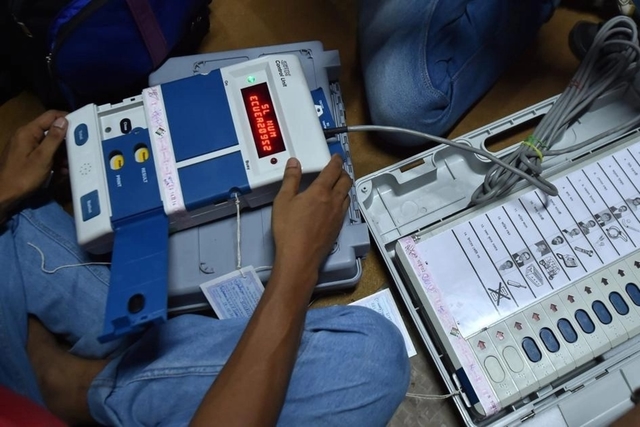Politics
EC Responds To Doubts Cast By I.N.D.I. Alliance On EVMs, Explains Why Those Banned In Germany Differ From Ones Used In India

An Electronic Voting Machine. (EVM)
Following concerns raised by members of the opposition I.N.D.I. Alliance in August regarding electronic voting machines (EVMs), the Election Commission (EC) took steps to address these issues.
The EC expanded its frequently asked questions (FAQs) page, responding to doubts raised by the opposition, such as the differences between Indian EVMs and those banned in Germany, the programmable memory of voter verified paper audit trails (VVPATs), and the sharing of software by EVM manufacturers with foreign microchip-makers.
Although the I.N.D.I. Alliance claimed on 19 December, that the EC was reluctant to meet with them, a report from Indian Express revealed that the EC had already responded, referring to the updated FAQs posted on 23 August. The FAQs now cover 76 questions, compared to the previous version which addressed 39 questions.
One new question addressed concerns whether EVM manufacturers, Bharat Electronics Ltd and Electronics Corporation of India Ltd, share confidential software with foreign chip manufacturers.
The EC's response emphasised that microcontrollers are programmed by BEL/ECIL within their secure facilities, with a stringent process involving designated engineers and high-level security measures — no external agencies, whether indigenous or foreign, are involved in loading the firmware program into microcontrollers.
Regarding VVPATs, the EC clarified that they have two types of memories — one for programme instructions stored for one-time programming of microcontrollers and another for storing graphical images, loaded in the presence of candidates or their representatives.
In response to the question about the differences between ECI EVMs and the voting systems banned in Germany, the EC explained that Indian EVMs are manufactured in secure facilities by Union government PSUs, undergo rigorous third-party testing, and implement different technologies and processes.
The German Constitutional Court's observations were specific to German elections and law.
The FAQs also address various claims about EVM tampering, dismissing assertions that EVMs can be manipulated using cellphone or Bluetooth devices as baseless and unscientific. The EC highlighted the availability of technical information about microcontrollers in the public domain, accessible on the manufacturers' websites.
Additionally, the FAQs address the claim of two million missing EVMs, stating that the matter is sub-judice, and clarifications have been provided to the High Court of Bombay.
The EC dismissed this as a misrepresentation of facts by vested interests.
Beyond addressing specific questions and claims, the EC's website provides information on EVM and VVPAT manufacturing, cost, testing, transportation, and deployment.
Support Swarajya's 50 Ground Reports Project & Sponsor A Story
Every general election Swarajya does a 50 ground reports project.
Aimed only at serious readers and those who appreciate the nuances of political undercurrents, the project provides a sense of India's electoral landscape. As you know, these reports are produced after considerable investment of travel, time and effort on the ground.
This time too we've kicked off the project in style and have covered over 30 constituencies already. If you're someone who appreciates such work and have enjoyed our coverage please consider sponsoring a ground report for just Rs 2999 to Rs 19,999 - it goes a long way in helping us produce more quality reportage.
You can also back this project by becoming a subscriber for as little as Rs 999 - so do click on this links and choose a plan that suits you and back us.
Click below to contribute.
Latest